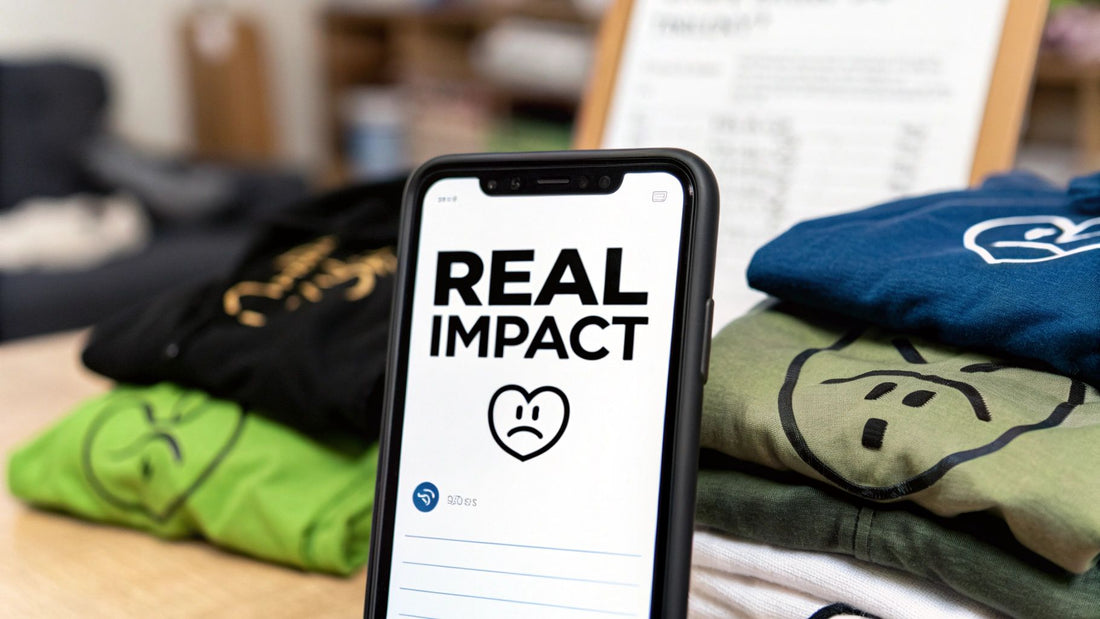
Choosing Mental Health Clothing Brands with Real Impact
Share
Mental health clothing brands are about so much more than just the latest trends. They’re part of a growing movement to break down the stigma surrounding mental wellbeing. Through powerful, statement-making designs, these brands are sparking crucial conversations.
Many also donate a portion of their profits to mental health charities, turning a simple purchase into a meaningful act of support.
Why Your Choice in Apparel Matters More Than Ever
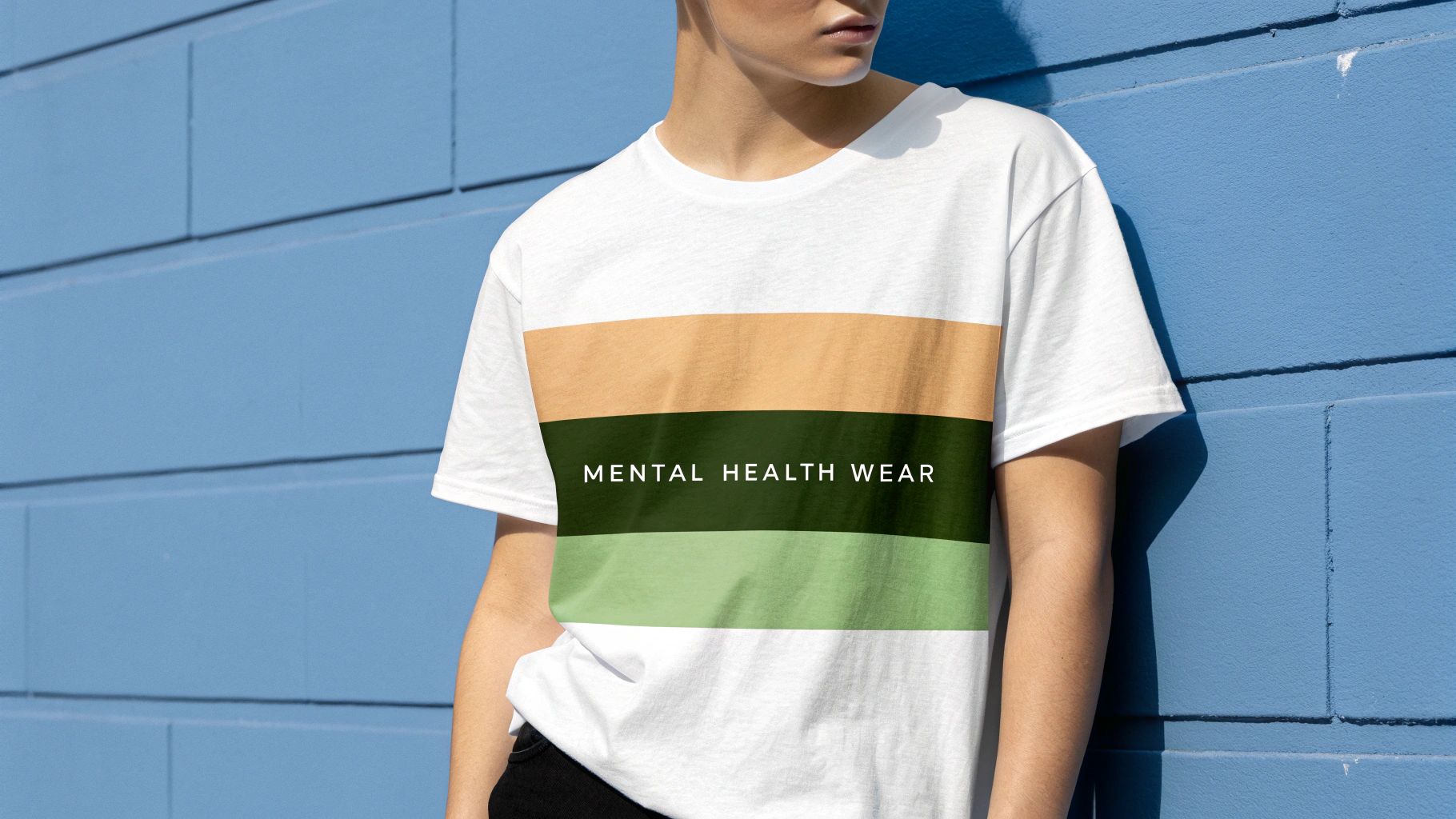
The conversation around mental health has never been more urgent. Here in the UK, the ripple effects are felt everywhere, touching individuals, families, and even the national economy. Poor mental health costs UK businesses up to £56 billion every single year in lost productivity and absenteeism. That staggering figure really underscores the need for more open dialogue and better support systems.
For young people, the picture is particularly concerning. Current statistics suggest that one in five children and young people has a probable mental health condition. This is a generation navigating a world where the curated perfection of social media can create immense pressure, often feeding into anxiety and low self-esteem.
The Power of a T-Shirt
This is where making a conscious choice about what you wear can make a real difference. A hoodie or t-shirt with a positive, supportive message can be a quiet act of solidarity. It helps to normalise these discussions and sends a clear signal to others that they aren't alone in their struggles.
By choosing to support authentic mental health clothing brands, you’re not just buying a piece of clothing; you’re contributing to a culture of empathy and understanding.
Of course, a garment is no substitute for professional help.
Before we go any further, it’s really important for me to be clear: I am not a mental health professional. This guide is for educational purposes only. If you or someone you know is struggling, please reach out to a doctor or another qualified healthcare provider for advice.
Beyond the Fabric
The true impact of your purchase goes far beyond the material itself. It’s in backing brands that are genuinely invested in the cause—brands that fund essential services, build supportive communities, and champion advocacy.
This guide is designed to help you find those brands. We’ll look at how you can verify their mission, check their impact, and make sure their ethical standards are as strong as their messaging. Understanding the power of clothing in enhancing mental well-being is the first step toward making choices that truly matter.
How to Verify a Brand's Mission and Authenticity
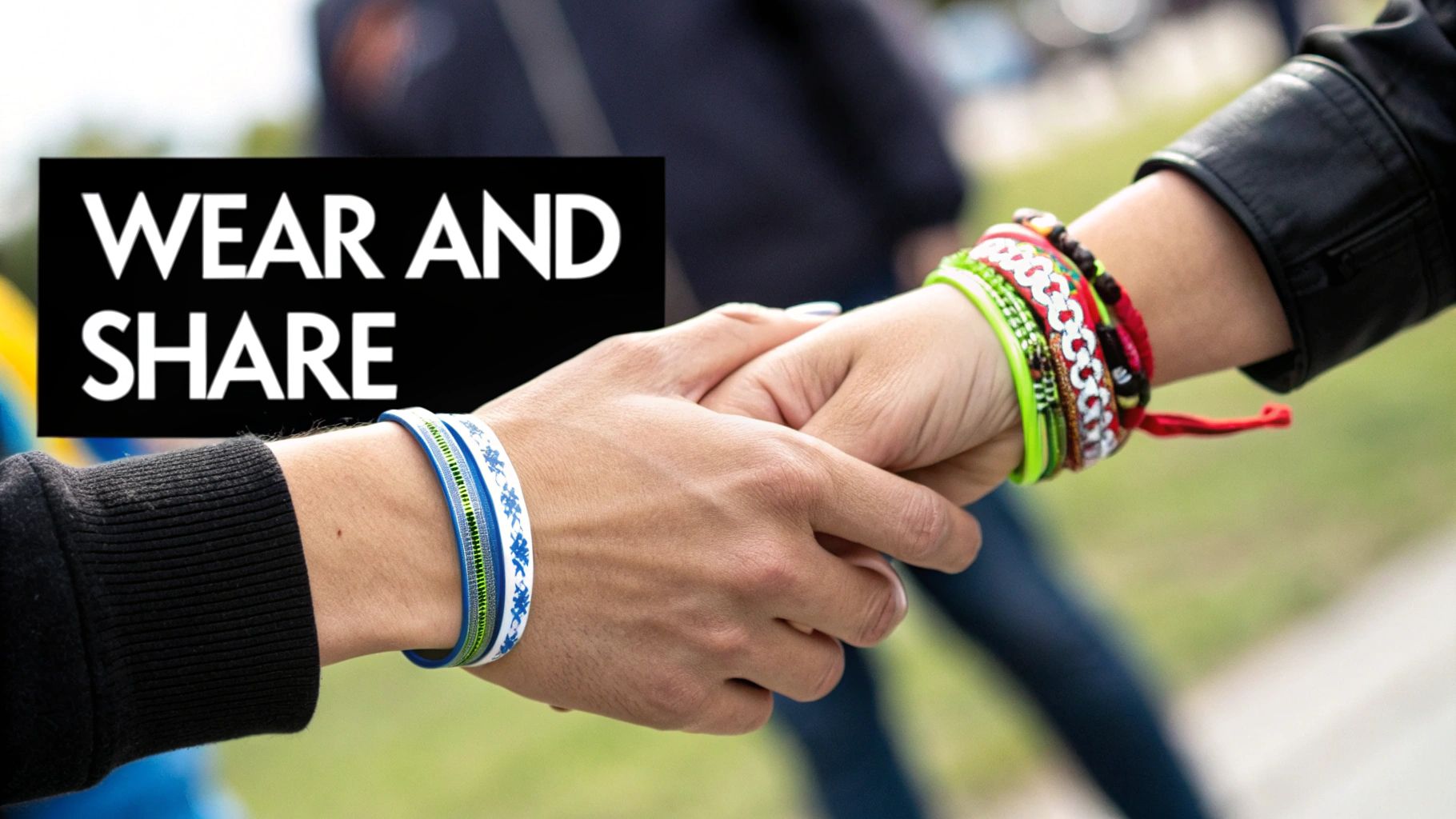
As more and more companies jump into the mental wellness space, it’s getting harder to tell who’s genuine and who’s just using clever marketing. It's crucial to do a bit of detective work to make sure a brand’s heart is really in the right place. Unfortunately, some brands use mental health as a hollow marketing angle—a practice sometimes called 'mental-washing'—so checking their claims is a must.
This wave of interest is particularly strong among younger generations in the UK. In fact, research shows that around 70% of millennials and Gen Z are very likely to purchase products that focus on wellbeing. They're the ones driving the demand for authentic mental health clothing brands, using their spending power to normalise these important conversations.
Digging into the Brand's Story
Your first stop should always be the brand's 'About Us' page and mission statement. These sections need to offer more than just fluffy promises. I always look for a clear, passionate founder's story that explains why they started the brand. Is there a real, personal connection to the cause, or does it read like a generic business pitch?
Authentic brands aren't shy about sharing their journey. They build a connection that feels much deeper than a simple sale.
A truly committed brand will be specific. Vague statements like "we support mental health causes" are a red flag. Instead, look for concrete details: which specific charities they partner with and exactly how much of each sale is donated.
Checking for Transparency and Real Partnerships
Transparency is everything when it comes to authenticity. A credible brand makes it easy to find details about their charitable contributions. Don't feel bad about double-checking if their partner organisations are registered charities. I even go a step further and look for proof of the partnership on the charity's own website.
Here’s what to look for:
- Check for Specifics: Do they donate 10% of profits, £1 per t-shirt, or something else? Clear, specific numbers show a real commitment.
- Verify Partnerships: Look for the logos of their partner charities and then cross-reference them. A genuine collaboration is usually shouted about from both sides.
- Look Beyond Slogans: Does their content actually offer helpful resources, support, or a sense of community? Or is it all just geared towards selling you a product?
When you’re looking into mental health clothing brands, making sure their claims are real is vital. It's similar to learning how to verify product authenticity, such as for UGG boots by checking materials and branding details. Applying that same critical eye here will help you quickly separate the true advocates from the opportunists.
Assessing a Brand's Real-World Impact
A cool slogan on a t-shirt is one thing, but does the brand behind it actually make a difference? If you really want your purchase to support the cause, you need to look past the marketing and dig into the real-world impact of the mental health clothing brands you're considering. It’s all about checking their charitable claims and understanding how they contribute beyond just writing a cheque.
Where Does the Money Actually Go?
A great first step is to look for partnerships with registered UK charities. Brands that are genuinely committed are usually proud of these collaborations and will feature them clearly on their website. Don't stop there, though. Take a moment to visit the charity's own website – you'll often find the brand mentioned there, too, which confirms the partnership is legit.
Another sign of a trustworthy brand is an annual impact report. These documents break down exactly where the money goes and what has been achieved with it. It's the kind of transparency that separates the genuinely impactful brands from the rest.
The infographic below shows just how quickly this market is growing, making it even more important to be discerning.
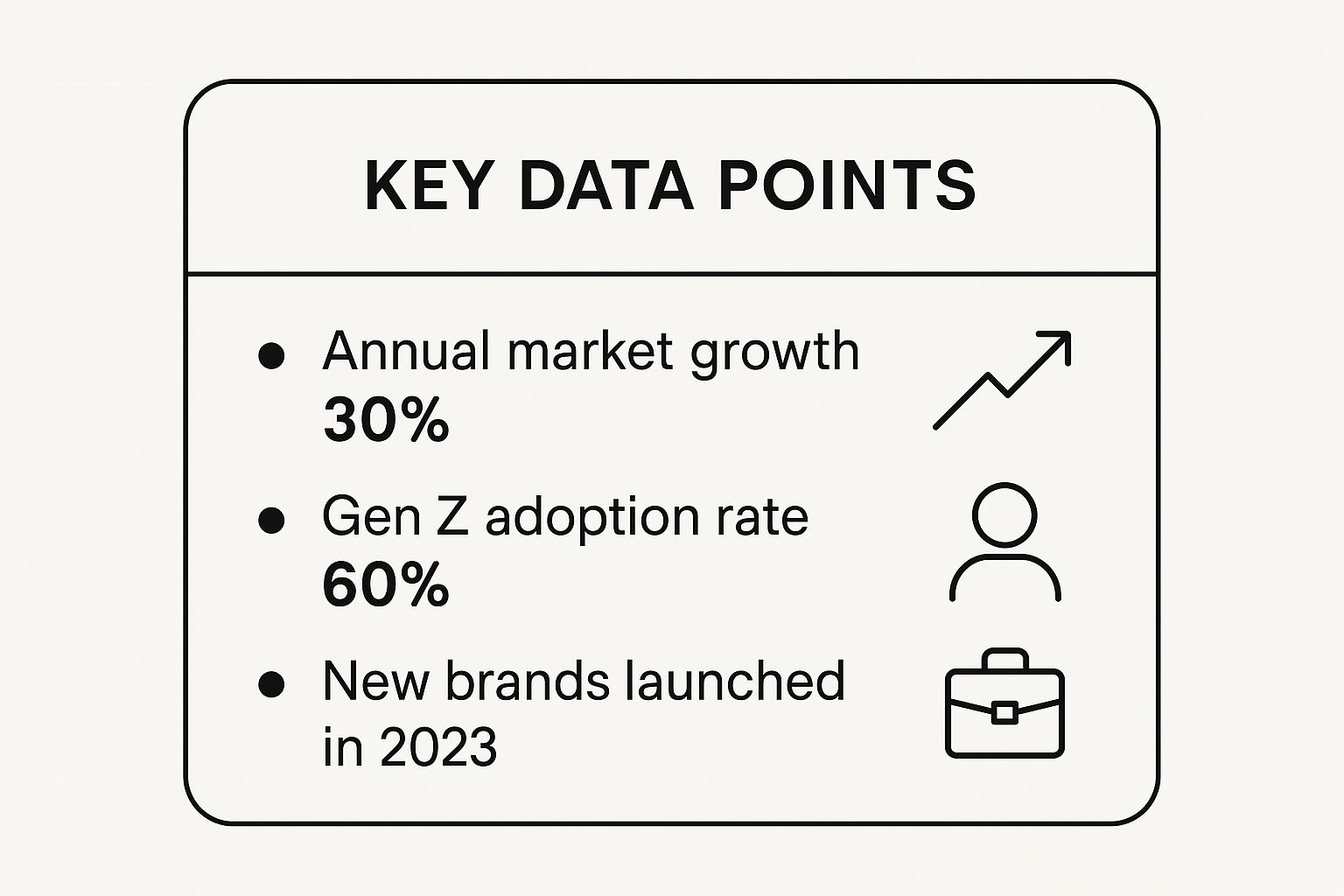
This explosion in popularity, especially among younger consumers, means more choice, but also a greater need to verify a brand's claims.
Beyond Donations: Building a Community
It’s also smart to compare different donation models. Some brands pledge a percentage of their profits, while others give a set amount for every item sold. A fixed amount per item can often be more transparent and meaningful, especially for smaller businesses where "profit" can be a tricky figure to pin down.
But the best brands do more than just donate. They're focused on building a supportive community. They use their platforms to share helpful resources, host events, or create safe online spaces where people can connect and feel understood. This kind of effort is a huge indicator of a brand’s long-term commitment. It’s a core part of the answer to whether mental health merch can help raise awareness and truly make a difference.
To help you out, I've put together a quick checklist to use when you're sizing up a new brand.
Brand Authenticity Checklist
Use this quick checklist to evaluate the authenticity and impact of mental health clothing brands before making a purchase.
| Evaluation Area | What to Look For | Red Flags |
|---|---|---|
| Donation Transparency | Clear details on the donation model (e.g., £1 per tee, 10% of profits). Publicly available impact reports. | Vague promises like "a portion of proceeds". No specific charity partner named. |
| Charity Partnerships | Named, registered charities. Cross-promotion on the charity's website. | No official partners listed. Unverifiable claims of support. |
| Community Building | Active blog with resources, supportive social media groups, or community events. | Social media is purely product-focused. No engagement beyond selling. |
| Founder's Story | A personal, genuine connection to the mental health cause is often shared. | The "why" behind the brand is generic or non-existent. |
| Product Messaging | Messages are empowering, sensitive, and thoughtfully designed. | Slogans are cliché, gimmicky, or trivialise mental health issues. |
Taking a few minutes to run through these points can help you feel confident that your purchase is supporting a brand that genuinely cares and contributes to the cause.
Connecting Quality Garments with Ethical Production
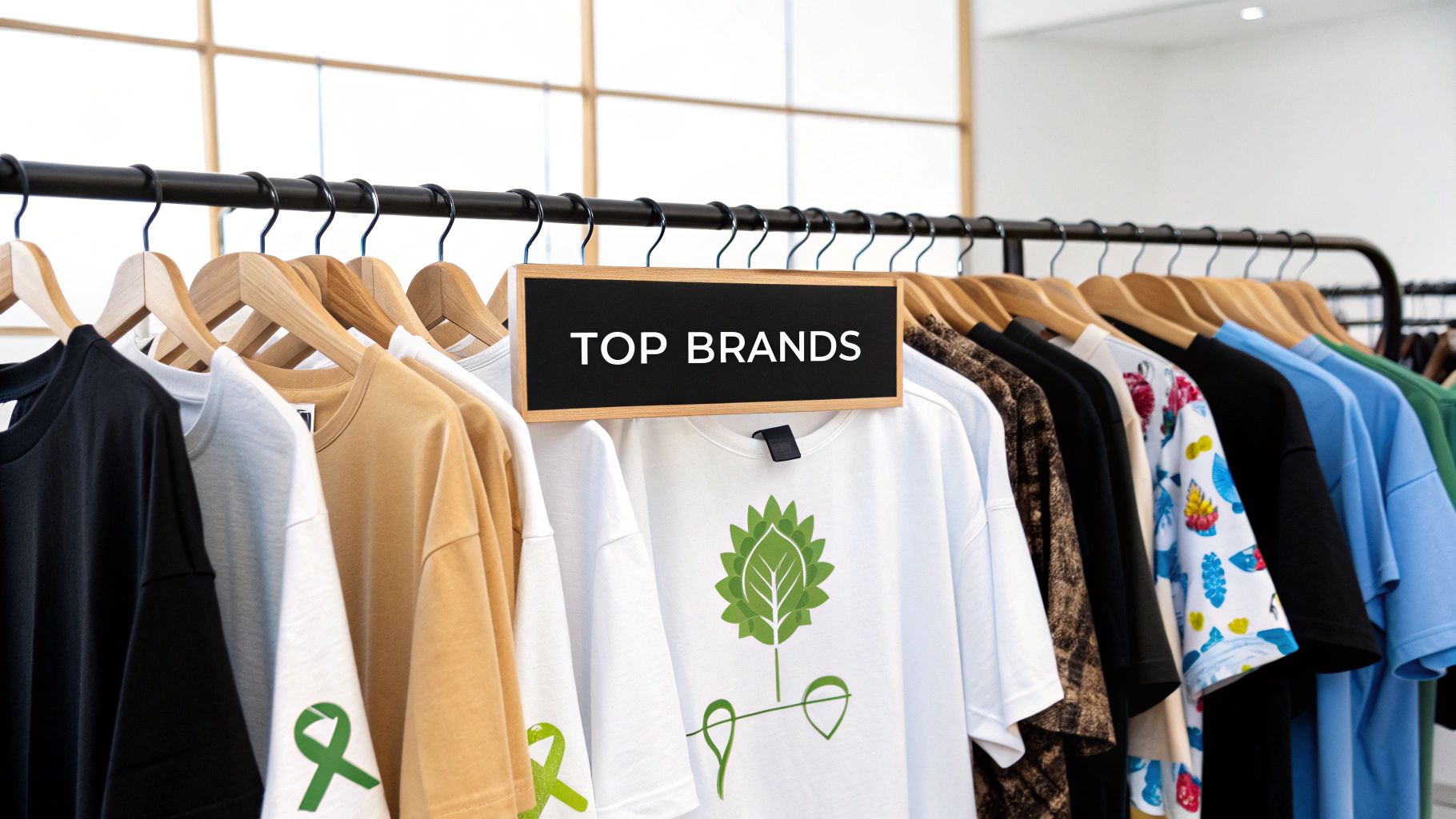
A brand that champions mental health has to walk the talk in every part of its business. It just doesn’t sit right for a company to promote wellbeing if its products are made in poor conditions or from materials that harm the planet. Real advocacy is stitched into the very fabric of the clothes they create.
When you're looking at mental health clothing brands, dig a little deeper into the quality and origin of their materials. Sustainable fabrics like organic cotton, bamboo, or recycled textiles are usually a strong sign that a brand is serious about looking after our world.
Looking for Proof of Ethical Practices
Certifications are your best friend here. They're an independent stamp of approval, confirming that a brand isn't just making empty promises.
Keep an eye out for these labels:
- Fair Trade: This ensures the people who made your clothes earned a fair wage and worked in a safe environment.
- GOTS (Global Organic Textile Standard): This is the gold standard for organic fibres, covering everything from the environmental impact to social criteria.
- OEKO-TEX: This label confirms that every single part of the item has been tested for harmful substances, making it safe for you to wear.
A brand genuinely invested in mental wellness wouldn't compromise the wellbeing of its workers or the planet just to make a profit. Their ethical stance should be consistent across the board.
Beyond the official labels, spend some time reading customer reviews to get a real feel for the garment quality. People are always quick to share if a t-shirt loses its shape after one wash or if the fabric is scratchy and uncomfortable. Comfort and durability really matter – clothing that feels good to wear can give you a small but meaningful boost.
Ultimately, choosing brands that use ethical materials, like a cosy recycled cotton mental health sweatshirt, means your purchase is supporting positive change right from the start. This holistic approach is the hallmark of a truly authentic and impactful brand.
What a Brand's Social Media Really Says About Them
Think of a brand’s social media feed as its digital front room. It tells you a lot about who they are and what they genuinely care about. When you’re looking at mental health clothing brands, their online vibe is a massive clue. You need to look past the slick product photos and ask yourself: are they actually trying to build a community here?
You can tell a lot from the content they share. Brands that are the real deal will use their platforms to post helpful resources, get positive conversations going, and create a safe space for their followers. Their feed won't just be an endless scroll of t-shirts and hoodies; you'll see links to support services, tips for calming anxiety, or maybe even team-ups with mental health professionals.
If all you see is a constant stream of "buy now," it’s a pretty clear sign that sales, not support, is their main goal.
For any online brand, the way they use social media shows what they're all about. This often comes down to their marketing choices, and you can get a better sense of different strategies for promoting brands and understanding customer engagement with tracking pixels.
The Comments Section Never Lies
This is where you see a brand’s true colours. Head straight to the comments. Are they getting involved with their followers in a real, empathetic way, or are they just replying to questions about shipping?
Pay close attention to how they handle negative or sensitive comments. A brand that truly cares will be on it, making sure their corner of the internet is safe and respectful for everyone. This isn’t just good practice; it's essential, especially when you consider social media’s often tricky relationship with our wellbeing.
It's also just smart business. Today, 52% of young UK shoppers find and buy fashion through social media, and they're specifically looking for brands that stand for something meaningful.
My biggest tip? Look for brands that create content to educate and lift people up, not just to sell a product. It shows they're invested in their community's wellbeing for the long haul, and that goes way beyond the clothes themselves.
Of course, wearing your support on your sleeve is a powerful statement, but true advocacy for mental health runs deeper than the fabric we choose. Think of mental health apparel as a conversation starter, an opening. The real work happens when we build a proper toolkit of resources to support our minds every single day.
It's about pairing that outward statement with genuine inward care. That means being mindful of our daily routines and the information we feed ourselves. One of the best ways to do this is to arm yourself with knowledge and practical strategies from people who really get it.
Digging Deeper with a Good Book
Diving into books written by professionals and, just as importantly, people with lived experience, can be incredibly validating. It offers new perspectives and a powerful sense of connection—that feeling of, "Ah, I'm not the only one."
Here are a few books that have made a real impact, offering comfort, solid advice, and a much deeper understanding of how our minds work:
- Reasons to Stay Alive by Matt Haig: An unflinchingly honest and hopeful memoir about navigating depression and finding a way through the darkness. It’s a huge comfort if you've ever felt alone in your struggle.
- The Body Keeps the Score by Bessel van der Kolk: This one is a game-changer. It breaks down how trauma physically reshapes the body and brain, offering a scientific but surprisingly accessible look at what it takes to heal.
- Notes on a Nervous Planet by Matt Haig: A brilliant look at how our modern world—with its endless notifications and constant pressure—is messing with our heads, and what we can do about it.
Simple Ways to find Calm in the Chaos
Along with reading, weaving simple relaxation techniques into your day can make a massive difference. You don't need to book a week-long retreat; even five minutes can be enough to hit the reset button on your nervous system.
For a quick win, try the 4-7-8 breathing technique. Just breathe in through your nose for four seconds, hold your breath for seven seconds, and then exhale slowly through your mouth for eight seconds. Doing this just a few times can instantly dial down stress.
Another simple but effective tip? Get outside for a short walk. Seriously, even just a quick five-minute stroll around the block can work wonders. There's a reason we're all told to "get some fresh air"—nature has a proven calming effect on the mind.
Just a quick heads-up: I'm not a mental health professional. These are just a few ideas that have helped on my own journey. If you’re genuinely worried about your mental health, the most important thing you can do is have a chat with your doctor or another qualified healthcare provider.
Still Have a Few Questions?
It's completely normal to have questions when you're looking into mental health apparel. In fact, it's a good thing – it shows you care about where your money is going. Let's clear up a few common queries.
Are These Brands Regulated in the UK?
This is a great question. Right now, there isn't a specific UK regulation just for "mental health clothing" as a category. This is exactly why doing a little bit of your own homework is so important.
The best way to feel confident is to look for brands that officially partner with registered charities. You can check any organisation’s status very easily on the Charity Commission website. Brands that are genuinely committed will always be open about how much they donate and where their products are made.
How Can I Tell if a Brand Is Genuinely Helping?
You can usually spot the real deal by looking for transparency and consistency. A brand that's truly making an impact won't be shy about it.
They’ll clearly state which charities they support and exactly what percentage or fixed amount from your purchase goes to them. Take a look at their website and social media – is it all about selling, or are they actively building a community, sharing helpful resources, and talking about mental wellbeing? If the details about their contributions are fuzzy, that’s a big red flag.
Does Wearing This Apparel Really Make a Difference?
Absolutely, it makes a difference on a couple of levels.
For you personally, it can be a quiet statement of self-expression, a personal reminder of your own strength and journey. But it goes beyond that. Socially, it’s a conversation starter. It’s a simple, visual way to help break down the stigma and make talking about mental health feel a little more normal.
And when you buy from an authentic brand, your purchase isn't just a T-shirt or a hoodie. It’s a direct contribution that helps fund vital support services and advocacy work. It creates a ripple effect of positive change that you helped start.
At Little Fish Books, we believe in nurturing emotional wellbeing from a young age with our books and resources, while our adult apparel line continues the conversation. Explore our collection to find meaningful ways to support mental health awareness for the whole family at https://thatsokay.co.uk.
